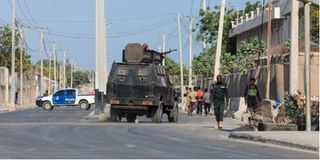Somalia vs Al-Shabaab, a local war with global implications

Security forces patrol outside a building which was attacked by suspected Al-Shabaab militants in Mogadishu on February 21.
Somalia has been waging a global war against the international terrorist organisation al-Shabaab. Yet the support from the international community has been minimal this far.
Facing an existential battle, however, Somalia cannot afford a lull. Neither should it fathom losing to the terrorist group.
Al-Shabaab has been terrorising the Somali people for 15 years, extorting people, even in areas controlled by the federal authorities. It has conducted dozens of terror attacks in the Somali capital, including the infamous October 14 2017 attack where more than 1,000 died.
Since last year, however, President Hassan Sheikh, in power for a second term, has made ending this menace his priority. The strategy adopts several methods: He made a deal with local clan militias, called Ma’awhisley to fight alongside federal troops, providing better knowledge on the ground and preventing sympathetic locals from helping the militants. So far, the Somali National Army, supported by the local clan militias, have liberated more than 80 districts.
But al-Shabaab is also a trans-boundary problem. Kenya has seen 3 tragic attacks where al-Shabaab targeted a shopping mall, a university and a hotel complex. The 147 students killed at Garissa University in 2015 horrified the world and showed what a danger the al-Shabaab is to those outside Somalia. Their recent incursions into Ethiopia appeared to be another attempt to show how lethal the al-Shabaab can be, especially to those who don’t expect their violence.
The war on al-Shabaab is happening as African Union peacekeepers begin their drawdown. Some 2,000 left at the end of June. Another 3,000 will go at the end of September. At one time, there were 22,000 African troops in Somalia. That doesn’t mean Somalia doesn’t need external support. The international community should redouble its funding for Somali forces. The clan militias have shown that local knowledge is key to defeating the terrorists.
By dropping the United Nations arms embargo on Somalia, gradually, these local forces can become better equipped.
By providing drone capabilities, al-Shabaab will have nowhere to hide.
Somalia has an annual budget of $950 million. Much of that is used to pay civil servants. Another portion goes to humanitarian needs. Somalia needs to spend on reforms to be able to receive debt relief, run other operations and fulfil obligations with international organisations.
That leaves the security burden underfunded.
The European Union and United Nations have been contributing about $1 billion a year to support the AU peacekeepers. That’s the entire Somali budget. A fraction of that could go to Somali forces, and the foreign troops' withdrawal sped up, leading to a stronger and faster result.
Beyond funding the fighting, international partners need to help Somalia stabilise liberated areas.
Basic infrastructure, including resources for local governance, will build communities’ resistance to the al-Shabaab. Simple things like local courts have been absent, leading the militants to fill the void.
Job creation, to keep youth from joining the terrorist ranks, is needed. International partners can not only bring the funds for this but administer programs mirroring those in their own countries, to provide youth with the ability to grow their own enterprises.
Somalia is poised to join the East Africa Community economic bloc and reap the rewards of free trade and regional cooperation. This should be a boon to the Somali economy and could lead to economic partnerships that help everyone in the EAC.
But Somalia’s neighbours need to avoid the temptation of meddling in the nation’s political affairs.
Some neighbours have recently taken on political positions that contradict the cardinal respect for the sovereignty of Somalia, something that does not help. Somali people need to make their own choices on who becomes their leaders and to keep the militants from coming back.
That means Somalia must also avoid the temptation to enter early celebrations or make wrong choices. Transparent state elections need to take place. Federal state Presidents cannot just extend their terms as they see fit. Good governance is achieved in part by allowing voters to reward or punish local leaders based on their performance.
As the President of Somalia Hassan Sheikh has outlined, the fight against al-Shabaab is not optional. It is a battle for our religion, our country, dignity and sovereignty. It is about the will to live in peaceful and prosperous Somalia, at peace with itself and with the world.
Abdirisak M. Aden, a former Permanent Secretary in the Somali Ministry of Information and presidential adviser, is the Executive Director for Farsight Africa Research & Policy Studies





